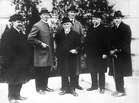
Unternavigation
The International Labour Organization (ILO) was founded in 1919 on the basis of the Treaty of Versailles and in connection with the League of Nations. The ILO and its affiliated International Labour Office, still based in Geneva, took a leading role in international workers’ protection and transnational social policy after the First World War. The ILO was founded on the notion that a stable peace among nations could only be achieved through the cooperation of employers, unions and the state. The International Association for Labour Legislation– the government-related precursor to the ILO – only afforded the workers and unions’ movement a subordinate role. This changed with the ILO: all national delegations in this organization are comprised of two official delegates plus a representative of employees and employers respectively.
Before the ILO began its work, the first International Labour Conference took place in Washington. The conference passed twelve draft agreements, which stipulated the introduction of the 48-hour week, measures against unemployment and protection for women, mothers and youths in industry. These resolutions were particularly significant for Switzerland as they put the demand for financial maternity protection on the political agenda. While the Federal Council and Parliament rejected the ratification of the corresponding convention for financial reasons, they did pass other special protections for women. The Federal Social Insurance Office was nevertheless commissioned to review the integration of maternity protection in health insurance. Yet, the reform was not passed until the mid-1920s. Another legislative proposal suffered the same fate just before the outbreak of the Second World War. In general, Switzerland long delayed its ratification of ILO conventions until the Second World War. In most cases, these conventions broadened the scope of social security. Altogether, only three of the 15 agreements were adopted.
Literatur / Bibliographie / Bibliografia / References: Herren-Oesch Madeleine (2009), Internationale Organisationen seit 1865. Eine Globalgeschichte der internationalen Ordnung, Darmstadt; Wecker Regina, Studer Brigitte, Sutter Gaby (2001), Die ‚schutzbedürftige Frau‘. Zur Konstruktion von Geschlecht durch Mutterschaftsversicherung, Nachtarbeitsverbot und Sonderschutzgesetzgebung, Zürich; Kneubühler Helen Ursula (1982), Die Schweiz als Mitglied der Internationalen Arbeitsorganisation, Bern.
(12/2014)




